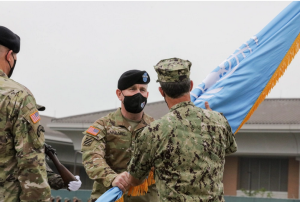For over 70 years, United Nations Command (UNC) has served as a multinational deterrent in preventing the simmering tension on the Korean Peninsula from boiling over into another wider conflict. With recent statements on a potential end-of-war declaration by the United States, South Korea, North Korea, and China, it is high time to consider the implications of such a declaration on the UNC.
South Korean President Moon Jae-in explained that “the end-of-war declaration would be a political statement that would announce that the longstanding hostile relations between Pyongyang and Washington has ended,” which would presumably pave the way for negotiations for a peace treaty. While there are concerns that an end-of-war declaration would raise doubts about the “rationale for the U.S. defense posture in South Korea,” the two are distinct topics that require negotiations or consultations among different parties. What is less clear is the future of the UNC if the South Korea-U.S. alliance and North Korea are not at war with each other.
Two days after the onset of the Korean War, on June 27, 1950, the United Nations Security Council adopted Resolution 83, which recommended “that the Members of the United Nations furnish such assistance to the Republic of Korea as may be necessary to repel the armed attack and to restore international peace and security in the area.” Ten days later, the U.N. Security Council passed Resolution 84, recommending “that all Members providing military forces and other assistance pursuant to the aforesaid Security Council resolutions [82 and 83] make such forces and assistance available to a unified commander under the United States of America,” which would “designate the commander of such forces.” Furthermore, the unified command was authorized “at its discretion to use the United Nations flag in the course of operations against North Korean forces.” Thus the UNC was born.
A week later, on July 15, the then South Korean President Rhee Syngman “assign[ed] to [General MacArthur] command authority over all land, sea, and air forces of the Republic of Korea during the period of the continuation of the present state of hostilities.”
Upon the cessation of hostilities of the Korean War, representatives from the UNC, (North) Korean People’s Army, and Chinese People’s Volunteer Army signed the armistice agreement. As a signatory to the agreement, the UNC is responsible for its provisions, such as the enforcement of “a complete cessation of all hostilities in Korea by all armed forces under their control” and administration and oversight of the demilitarized zone south of the military demarcation line.
As the South Korean military developed its capabilities in the following decades, the South Korea-U.S. alliance agreed that South Korea should increase its role in the defense planning structure and established in 1978 the binational Republic of Korea-United States Combined Forces Command (CFC). The CFC assumed warfighting responsibility from the UNC, which means that if hostilities were to resume on the Korean Peninsula, the commander of the CFC would command American and South Korean forces. The UNC’s role thus “shifted to maintaining and enforcing the Armistice Agreement” and “coordinating…and integrating multinational military forces in support of the combined forces of South Korea and the United Nations Command.”
An end-of-war declaration would presumably supersede the armistice agreement, which only assures the cessation of hostilities (which has previously been broken on multiple occasions) in an ongoing war. If the armistice agreement is no longer valid, what would be the UNC’s role, if any, with an end-of-war declaration? There may also be calls to rescind U.N. Security Council Resolutions 83 and 84 in the absence of war on the Korean Peninsula. As these resolutions legitimized the establishment of the UNC, can it continue to exist if they are no longer in effect?
Although it is impossible to determine exactly the deterrent effect of the UNC, the historical provision of forces by 16 U.N. member states and their future commitment (albeit non-binding and nearly 70 years old) demonstrate multinational opposition to North Korean hostilities. The United States and South Korea will likely require conditions that North Korea must first meet before agreeing to an end-of-war declaration, but it will be much easier for North Korea to renege on those conditions than to reestablish a multinational coalition after disestablishing the UNC. The latter will undoubtedly be nearly impossible absent unforeseen and catastrophic circumstances.
As the South Korea-U.S. alliance continues to develop and the two countries’ relations with other regional and international actors also enter new stages, they must be open to new means “to strengthen the fabric of peace in the Pacific area.” Sometimes that will require significant shifts in ways of thinking and organizational structures. Leaders, however, must consider all potential implications and weigh their benefits and drawbacks. Otherwise, they may risk achieving a nominal political victory while sacrificing a longtime security guarantor.

































